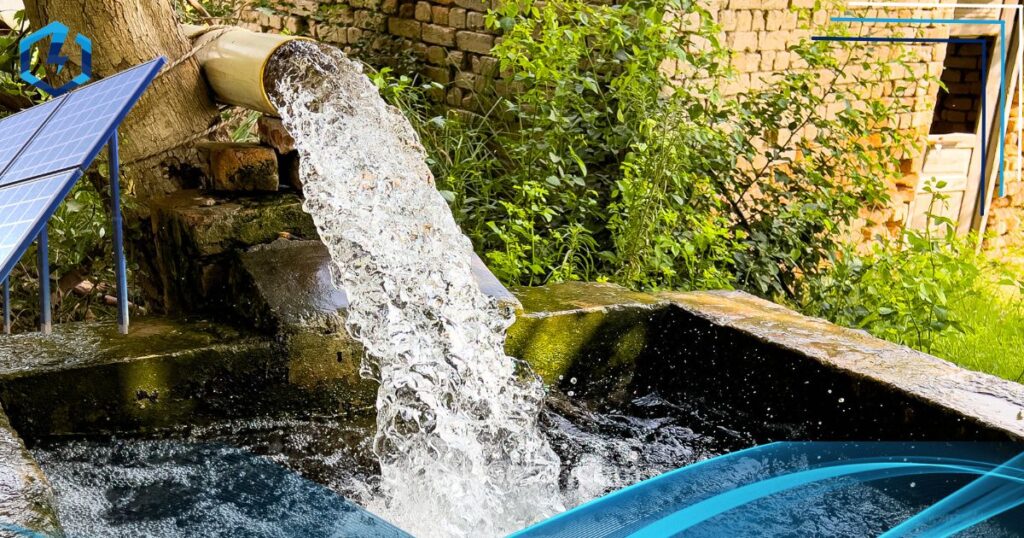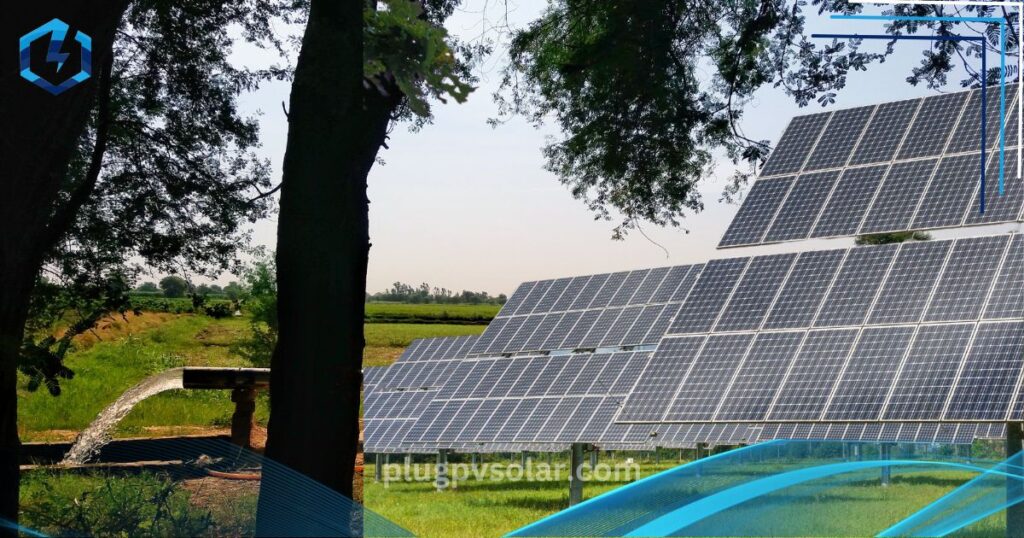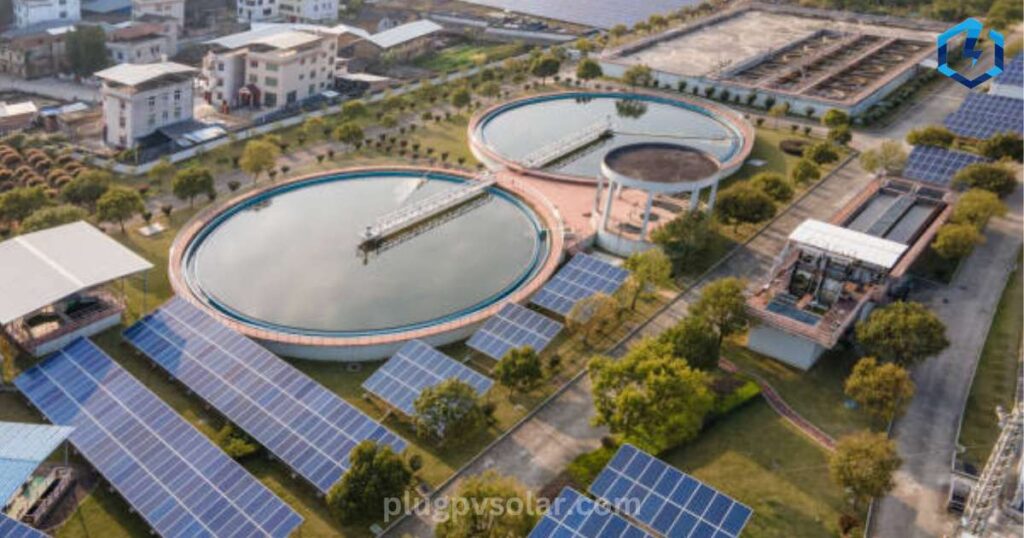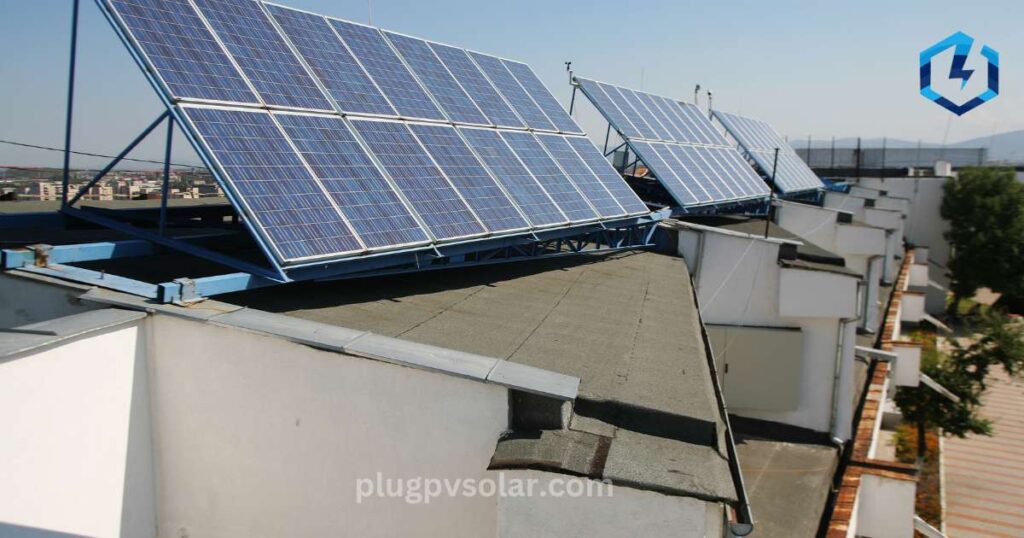
Plug PV Tubewell Solar System in Pakistan
The Plug PV Tubewell solar system arises as a beacon of hope in the agricultural landscape of Pakistan, where water scarcity and energy costs pose significant obstacles. This revolutionary solution combines solar power technology with classic tubewell systems, providing a sustainable and cost-effective irrigation option.
Plug Pv - best Tubewell solar System company in Pakistan
Pakistan’s leading Tube well solar system vendor is Plug PV Solar. We have a varied portfolio of successful projects in this field. Plug PV designs and implements client-specific tubewell solar solutions. These devices enable Pakistani small and large businesses cut energy expenditures and implement sustainable energy solutions. Tubewell systems’ ability to generate cheap renewable energy is driving their popularity in Pakistan. Solar energy is a valuable investment for enterprises, especially since most commercial premises have enough room for solar panels. Businesses can reduce their cost per watt and optimize energy savings by adding tubewell solar panels.
Importance of Tubewell Solar Systems in Pakistan
Pakistan’s agricultural economy relies mainly on groundwater extraction via tubewells for irrigation. However, typical tubewell systems driven by fuel or electricity can have high operating costs and contribute to environmental damage. The emergence of Plug PV Tubewell solar systems tackles these concerns by using solar energy to power water pumps, reducing reliance on fossil fuels, and lowering carbon emissions.
Advantages of the Tubewell Solar System
Cost-effectiveness:
One of the key benefits of the Plug PV Tubewell solar system is its cost-effectiveness. Farmers that use solar energy as a renewable resource can significantly lower their operational costs linked with diesel or electricity. This equates to long-term cost savings and increased profitability, making sustainable agriculture more economically viable.
Environmentally friendly:
Unlike traditional tubewell systems that use fossil fuels, Tubewell pump solar systems use clean, renewable solar energy. By reducing dependency on diesel generators or grid electricity, these technologies help to reduce carbon emissions and pollution. Using solar-powered irrigation not only saves natural resources but also supports environmental sustainability for future generations.
Energy independence:
Tubewell solar systems give farmers energy independence, freeing them from the constraints of fluctuating fuel prices and unstable grid electricity. With plentiful sunlight available throughout Pakistan, solar power provides a dependable and consistent energy source for irrigation. This energy independence enables farmers to run their activities more efficiently and reduces the dangers associated with energy changes.

Challenges and solutions
Initial setup cost:
While the initial setup cost of PV Tubewell solar systems may appear overwhelming to some farmers, it is considered the long-term benefits and ROI. Government incentives, subsidies, and financing options are available to help farmers convert to solar-powered irrigation, making it a viable and long-term investment.
Maintenance challenges:
Tubewell solar systems require regular maintenance to ensure peak performance and lifetime. Farmers, with adequate training and help from manufacturers or service providers, may effectively manage maintenance duties such as cleaning solar panels, inspecting equipment, and troubleshooting frequent problems. Furthermore, proactive steps such as routine servicing and inspections can reduce downtime and increase system efficiency.
Government incentives:
The government plays a vital role in promoting the concept of renewable energy sources and technologies such as PV Tubewell solar systems. In Pakistan, several incentive schemes, subsidies, and tax breaks are offered to encourage farmers to engage in solar-powered irrigation. Farmers can use these government efforts to defray initial setup expenses and speed the transition to sustainable agriculture.
Call Us For Tubwell Solar System Installation
Installation Process:
Site evaluation:
The installation procedure begins with a thorough site assessment performed by knowledgeable solar energy professionals. Sunlight exposure, water availability, soil characteristics, and terrain are all considered while determining the best location to install solar panels and tubewell infrastructure. This thorough planning provides optimum energy capture and efficient water pumping, which improves the entire system’s performance.
Tubewell Pump Installation:
After the site inspection, the next stage is to install the appropriate equipment, such as solar panels, inverters, pumps, and storage tanks. Skilled experts carefully arrange the solar panels to optimize sunshine exposure before connecting them to the inverter, which turns solar energy into valuable electricity. The water pump is then added to the system, along with storage tanks for water storage and delivery.
Testing and commissioning:
After the equipment is installed, the entire system is thoroughly tested and commissioned to ensure its functionality and performance. Technicians do rigorous tests to ensure that all components are functioning correctly and effectively. Any errors or anomalies are rectified as soon as possible to ensure optimal system performance and dependability.
OUR OTHER SOLAR SYStem
Components of the PV Tubewell System:
Solar panels:
Solar panels are at the heart of the PV Tubewell solar system, capturing sunlight and converting it into electricity using photovoltaic cells. These panels are often installed on rooftops or in ground-mounted arrays, precisely positioned to maximize sunlight exposure throughout the day. High-quality solar panels are required to maximize energy production while also maintaining the system’s long-term stability.
Inverter:
The inverter is the most important component of the Tubewell solar system. It converts (DC) direct current electricity generated by the solar panels into (AC)alternating current electricity that can be used to operate the water pump. Inverters come in a variety of sizes and configurations to meet varying system capacity and voltage needs. Choosing the correct inverter is crucial for improving energy conversion efficiency and overall system performance.
Pump:
The water pump is the essential component that extracts groundwater from the tubewell and distributes it for irrigation. A PV Tubewell solar system uses electricity generated by solar panels to power the pump, removing the need for traditional fuel-based pumps. Submersible pumps are often utilized in these systems because of their efficiency, dependability, and ability to work in remote regions.
Storage tanks:
Storage tanks are used to hold water pumped from the tubewell for later use in irrigation. These tanks are available in a number of sizes and configurations to fulfill the agricultural operation’s water demand and irrigation needs. Adequately sized and strategically placed storage tanks offer a continuous and dependable water supply for crops, even during seasons of low sunlight or high water demand.
Plug PV - SOLAR ENERGY PARTNER
Plug Pv is best Tubewell solar panel installation company in Pakistan. We provide full-service end-to-end solar solutions and project management from beginning to end.
1
Free Site Analysis
5
Inspections
2
Engineering and Design Services
6
Monitoring
3
Installation
7
Ongoing Service
4
Permitting
8
Maintenance
SUITABILITY AND EFFICIENCY:
Climate considerations:
The appropriateness and efficiency of PV Tubewell solar systems are determined by a variety of climate parameters, including sunshine availability, temperature, humidity, and precipitation patterns. Solar-powered irrigation is most suited to regions with ample sunlight and constant weather conditions, as they can maximize energy output and irrigation efficiency year-round. Even in less favorable conditions, PV Tubewell systems can deliver significant benefits with proper planning and optimization.
Irrigation needs:
Crop water requirements, soil type, and irrigation schedule determine the effectiveness of Tubewell solar systems in meeting irrigation needs. Farmers may improve water efficiency and reduce waste by precisely measuring these elements and constructing the system accordingly. Lates irrigation systems, such as drip irrigation or precision irrigation, can improve water efficiency and agricultural production while optimizing the benefits of solar irrigation.
System sizing:
Proper sizing of PV Tubewell solar systems is critical for best performance and efficiency. During the system design phase, it is essential to consider factors such as water demand, pump capacity, solar panel capacity, and storage tank size. Oversized or undersized systems can result in inefficiencies, higher energy consumption, and lower overall system reliability. Farmers may maximize energy savings and irrigation efficacy by appropriately designing the system based on their specific needs and site conditions.
Maintenance and upkeep:
PV Tubewell solar systems must be cleaned and inspected on a regular basis to ensure peak performance and efficiency. This includes solar panels, inverters, and pumps. Dust, grit, and debris can build up on solar panels over time, limiting their energy output potential. Surface impurities can be removed and panel efficiency restored through periodic washing with water and mild detergent. Similarly, evaluating other system components for signs of wear, damage, or malfunction is critical for detecting and resolving possible problems before they worsen.
Troubleshooting frequent issues:
Despite the dependability of PV Tubewell solar systems, equipment failure, ambient conditions, or incorrect maintenance can all cause problems or malfunctions on occasion. Common issues, including pump failure, inverter malfunction, or electrical failures, can disrupt system operation and reduce irrigation efficacy. Farmers should become familiar with the troubleshooting processes supplied by manufacturers or service providers and fix any faults as soon as possible to reduce downtime and ensure continuous operations.
Expert servicing:
Simple maintenance tasks can be completed by farmers themselves, while more complex repairs or servicing may necessitate specialist assistance. Qualified personnel with experience in solar energy systems can quickly detect and rectify problems, causing minimal disturbance to agricultural activities. Establishing a service contract with a respected provider can provide peace of mind and provide prompt assistance when maintenance or repairs are required.
Financial considerations:
Initial investment:
The cost of constructing a PV Tubewell solar system varies depending on system size, equipment quality, installation difficulty, and location. At the same time, the initial investment may appear high. It is essential to consider the long-term advantages and cost reductions connected with solar-powered irrigation. Furthermore, farmers can benefit from a variety of financing alternatives, government subsidies, and incentive programs to help them migrate to renewable energy, making it a financially viable investment in sustainable agriculture.
Return on investment:
One of the most appealing elements of PV Tubewell solar systems is their potential to provide a substantial return on investment over time. Agriculturalists can save money and increase their profits by lowering operational costs associated with diesel or power consumption. Furthermore, higher agricultural yields from more effective irrigation procedures can boost the economic benefits of solar-powered irrigation. As energy prices rise, the financial benefits of solar energy become more evident, establishing PV Tubewell systems as a wise investment for the future.
Finance options:
To help farmers install PV Tubewell solar systems, a variety of finance and support mechanisms are available, including loans, grants, subsidies, and leasing agreements. Government-sponsored programs and initiatives seek to make renewable energy technology more accessible and inexpensive to agricultural stakeholders, hence encouraging widespread adoption and implementation. Farmers may overcome financial barriers and adopt sustainable irrigation practices that help both their bottom line and the environment by researching these financing options and taking advantage of available incentives.
Suitability and Efficiency:
Climate considerations:
The appropriateness and efficiency of PV Tubewell solar systems are determined by a variety of climate parameters, including sunshine availability, temperature, humidity, and precipitation patterns. Solar-powered irrigation is most suited to regions with ample sunlight and constant weather conditions, as they can maximize energy output and irrigation efficiency year-round. Even in less favorable conditions, PV Tubewell systems can deliver significant benefits with proper planning and optimization.
Irrigation needs:
Crop water requirements, soil type, and irrigation schedule determine the effectiveness of Tubewell solar systems in meeting irrigation needs. Farmers may improve water efficiency and reduce waste by precisely measuring these elements and constructing the system accordingly. Lates irrigation systems, such as drip irrigation or precision irrigation, can improve water efficiency and agricultural production while optimizing the benefits of solar irrigation.
System sizing:
Proper sizing of PV Tubewell solar systems is critical for best performance and efficiency. During the system design phase, it is essential to consider factors such as water demand, pump capacity, solar panel capacity, and storage tank size. Oversized or undersized systems can result in inefficiencies, higher energy consumption, and lower overall system reliability. Farmers may maximize energy savings and irrigation efficacy by appropriately designing the system based on their specific needs and site conditions.
Maintenance and upkeep:
PV Tubewell solar systems must be cleaned and inspected on a regular basis to ensure peak performance and efficiency. This includes solar panels, inverters, and pumps. Dust, grit, and debris can build up on solar panels over time, limiting their energy output potential. Surface impurities can be removed and panel efficiency restored through periodic washing with water and mild detergent. Similarly, evaluating other system components for signs of wear, damage, or malfunction is critical for detecting and resolving possible problems before they worsen.
Troubleshooting frequent issues:
Despite the dependability of PV Tubewell solar systems, equipment failure, ambient conditions, or incorrect maintenance can all cause problems or malfunctions on occasion. Common issues, including pump failure, inverter malfunction, or electrical failures, can disrupt system operation and reduce irrigation efficacy. Farmers should become familiar with the troubleshooting processes supplied by manufacturers or service providers and fix any faults as soon as possible to reduce downtime and ensure continuous operations.
Expert servicing:
Simple maintenance tasks can be completed by farmers themselves, while more complex repairs or servicing may necessitate specialist assistance. Qualified personnel with experience in solar energy systems can quickly detect and rectify problems, causing minimal disturbance to agricultural activities. Establishing a service contract with a respected provider can provide peace of mind and provide prompt assistance when maintenance or repairs are required.
Financial considerations:
Initial investment:
The cost of constructing a PV Tubewell solar system varies depending on system size, equipment quality, installation difficulty, and location. At the same time, the initial investment may appear high. It is essential to consider the long-term advantages and cost reductions connected with solar-powered irrigation. Furthermore, farmers can benefit from a variety of financing alternatives, government subsidies, and incentive programs to help them migrate to renewable energy, making it a financially viable investment in sustainable agriculture.
Return on investment:
One of the most appealing elements of PV Tubewell solar systems is their potential to provide a substantial return on investment over time. Agriculturalists can save money and increase their profits by lowering operational costs associated with diesel or power consumption. Furthermore, higher agricultural yields from more effective irrigation procedures can boost the economic benefits of solar-powered irrigation. As energy prices rise, the financial benefits of solar energy become more evident, establishing PV Tubewell systems as a wise investment for the future.
Finance options:
To help farmers install PV Tubewell solar systems, a variety of finance and support mechanisms are available, including loans, grants, subsidies, and leasing agreements. Government-sponsored programs and initiatives seek to make renewable energy technology more accessible and inexpensive to agricultural stakeholders, hence encouraging widespread adoption and implementation. Farmers may overcome financial barriers and adopt sustainable irrigation practices that help both their bottom line and the environment by researching these financing options and taking advantage of available incentives.
PLUG PV OFFERS 25-YEAR QUALITY WARRANTY ON Tube well SOLAR System
Conclusion
Plug PV Tubewell solar system is a game-changing solution for sustainable agriculture in Pakistan. These systems, which use the sun’s energy to pump water for irrigation, provide a low-cost, ecologically beneficial, and energy-independent alternative to typical tubewell systems. From decreasing operational costs and carbon emissions to empowering local farmers and supporting economic development.


